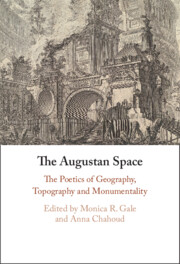Book contents
- The Augustan Space
- The Augustan Space
- Copyright page
- Contents
- Notes on Contributors
- Preface
- Abbreviations
- Introduction
- Chapter 1 The City in Horace’s sermo
- Chapter 2 excucurristi a Neapoli
- Chapter 3 Poetic and Imperial Spaces in Propertius, Books 1–3
- Chapter 4 Horace on Sacred Space
- Chapter 5 Roman Topography, Politics and Gender
- Chapter 6 aurea nunc, olim siluestribus horrida dumis
- Chapter 7 Hippolytus and Egeria in the Woods of Aricia (Virgil, Aen. 7.761–82 and Ovid, Met. 15.479–551)
- Chapter 8 locum tua tempora poscunt
- Chapter 9 imperii Roma deumque locus
- Chapter 10 The Rise and Fall of Virgil’s Sublime Carthage
- Chapter 11 Eccentric Poetry
- Chapter 12 Virgilian Heterotopias
- Chapter 13 loci desperati
- Works Cited
- Index Locorum
- General Index
Chapter 5 - Roman Topography, Politics and Gender
The Cult of Bona Dea in Propertius 4.9 – An Answer to Aeneid 8?
Published online by Cambridge University Press: aN Invalid Date NaN
- The Augustan Space
- The Augustan Space
- Copyright page
- Contents
- Notes on Contributors
- Preface
- Abbreviations
- Introduction
- Chapter 1 The City in Horace’s sermo
- Chapter 2 excucurristi a Neapoli
- Chapter 3 Poetic and Imperial Spaces in Propertius, Books 1–3
- Chapter 4 Horace on Sacred Space
- Chapter 5 Roman Topography, Politics and Gender
- Chapter 6 aurea nunc, olim siluestribus horrida dumis
- Chapter 7 Hippolytus and Egeria in the Woods of Aricia (Virgil, Aen. 7.761–82 and Ovid, Met. 15.479–551)
- Chapter 8 locum tua tempora poscunt
- Chapter 9 imperii Roma deumque locus
- Chapter 10 The Rise and Fall of Virgil’s Sublime Carthage
- Chapter 11 Eccentric Poetry
- Chapter 12 Virgilian Heterotopias
- Chapter 13 loci desperati
- Works Cited
- Index Locorum
- General Index
Summary
In Elegy 4.9, Propertius provides an aetiology for a detail of the cult of Hercules at the Ara Maxima: the prohibition on women attending the ceremony. He presents this particularity as a retaliatory measure taken by the hero himself, who reacted to the banning of any male from the space in which the cult of Bona Dea is celebrated. Propertius describes the priestess of Bona Dea as trying to prevent Hercules from entering the sacred space by arguing that female chastity must be respected. After having argued that there is no insurmountable difference between the sexes since there may be role reversal between men and women, Hercules forces the door. Propertius uses this episode located in ancient Latium to put forward some reflections on a (modern) topic, specific to the elegiac genre: sexual identity and gender relations. He presents an alternative point of view that includes both facets of what Augustus seeks to impose in his politics of promoting ancient social practices, essentially concerned with control over morality and sexuality: a strict conception of female morality, and a crucial questioning of gender conceptions: what makes the difference between the sexes? It is dress, behaviour or the body?
Keywords
- Type
- Chapter
- Information
- The Augustan SpaceThe Poetics of Geography, Topography and Monumentality, pp. 85 - 97Publisher: Cambridge University PressPrint publication year: 2024



